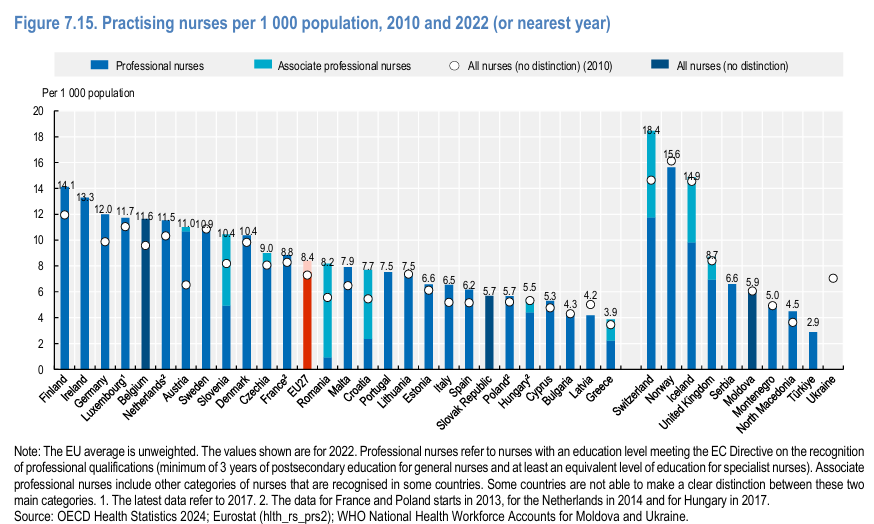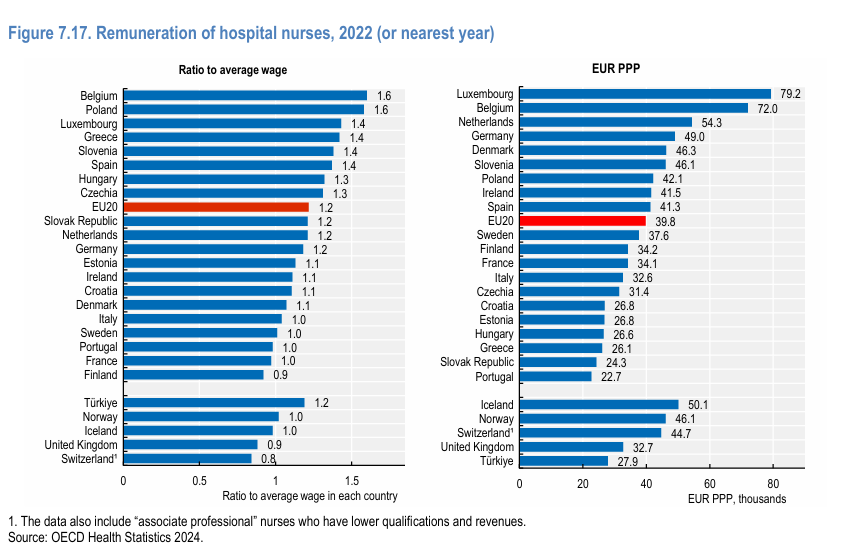Keep our news free from ads and paywalls by making a donation to support our work!

Notes from Poland is run by a small editorial team and is published by an independent, non-profit foundation that is funded through donations from our readers. We cannot do what we do without your support.
Around 2,000 healthcare workers have protested in front of Prime Minister Donald Tusk’s office in Warsaw, demanding pay increases and other measures to address staff shortages in Polish hospitals. Tusk did not meet with the protesters, but their petition was handed over to one of his ministers.
According to OECD figures, Poland has 5.7 nurses per 1,000 inhabitants, well below the EU-wide average of 8.4. The lowest figures are found in Greece (3.9), Latvia (4.2) and Bulgaria (4.3), while the highest are in Finland (14.1), Ireland (13.3) and Germany (12.0).
The main organiser of this week’s protest, the National Union of Nurses and Midwives (OZZPiP) – Poland’s largest association of medical professionals, with around 80,000 members – says that over 70% of Polish hospitals struggle with a shortage of nurses.

From Health at a Glance: Europe 2024, OECD
They also note that Polish nurses are on average among Europe’s oldest. A report last year by the Supreme Chamber of Nurses and Midwives found that the average nurse in Poland is 54 years old, which is 10 years higher than the average 15 years ago.
Krystyna Ptok, head of the OZZPiP, told broadcaster RMF that the “average is [now] approaching 60”. She also noted that by 2030, around 65% of currently employed nurses and 60% of midwives will have reached retirement age.
“[This protest] is about increasing salaries, but also about the problem of the shortage of nurses in the public health system and the inaction of politicians in this regard,” said Ptok.
The protesters – mostly nurses and midwives but also physiotherapists and other healthcare workers – gathered in front of Tusk’s chancellery yesterday for two hours. They chanted “Where is the prime minister?” and held cardboard cut-outs of nurses to symbolise the shortages.
🇵🇱 Protest pielęgniarek w stolicy.
Blisko dwa tysiące pielęgniarek zebrało się przed siedzibą premiera w Warszawie.
Donald Tusk do nich jednak nie wyszedł. pic.twitter.com/LYYRRxwXW0
— Aneczka 🇵🇱 (@AneczkaKon69192) November 19, 2024
In Tusk’s absence, the protesters’ petition was handed over to the government’s minister for senior affairs, Marzena Okła-Drewnowicz, who promised to pass it on to the prime minister. Tusk himself has not yet responded to the protest.
OZZPiP has expressed frustration that there has been no legislative progress on a so-called citizen’s bill that it submitted to parliament in May 2023. Such legislation must be considered by parliament if it receives at least 100,000 public signatures. The OZZPiP’s bill received over 120,000.
It envisions pay rises for medical professionals as well as linking salaries with qualifications in such a way that employees with higher levels of education and/or specialisations would earn more.
The OZZPiP claims that nurses and midwives are the only professions in Poland that do not have their salaries linked to the level of their education.
After the proposed changes, the lowest guaranteed monthly basic salary for medical professionals would range between 6,917.30 zloty and 7,932.69 zloty (€1592-1826). For nurses, the current minimum pay is 6,726.15 zloty. Poland’s average wage stood at 8,038.41 zloty in the second quarter of this year.
However, according to the OECD’s figures, Poland’s nurses are actually relatively well paid compared to their counterparts elsewhere in Europe. Their earnings on the basis of purchasing power parity (PPP), a measure that takes account of differences in cost of living, is above the EU average.
In terms of the ratio of nurses’ pay compared to the average wage, Poland’s figure of 1.6 is the second best in Europe, behind only Belgium and well above the EU-wide figure of 1.2. Poland also saw the second-largest relative rise in nurses’ pay between 2019 and 2022, behind only Hungary.

From Health at a Glance: Europe 2024, OECD
In response to the OZZPiP’s proposals for further pay rises, early this year the new government – which took office in December 2023 – announced that there are not enough funds in the budget.
Instead, it suggested that the raises be spread over five instalments starting in 2025 and that they be granted to only two of the four groups of healthcare workers mentioned in the bill. According to the OZZPiP, parliamentary work on the legislation has been frozen ever since.
The union argues that, without increases, it will be impossible to attract the new, younger staff necessary to fill growing personnel gaps in Poland’s healthcare system.
The OECD’s figures show that overall healthcare expenditure in Poland is among the lowest in the EU, both in per capita terms (at PPP) and as a percentage of GDP.

From Health at a Glance: Europe 2024, OECD

Notes from Poland is run by a small editorial team and published by an independent, non-profit foundation that is funded through donations from our readers. We cannot do what we do without your support.
Main image credit: Jacek Marczewski / Agencja Wyborcza.pl

Agata Pyka is a former assistant editor at Notes from Poland. She specialises in Central and Eastern European affairs, cybersecurity, and investigative reporting. She holds a master’s degree in political communication from the University of Amsterdam, and her work has appeared in Euractiv, the Balkan Investigative Reporting Network (BIRN), and The European Correspondent, among others.



















